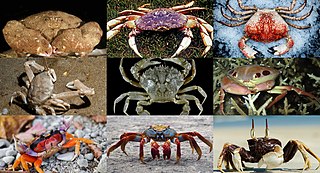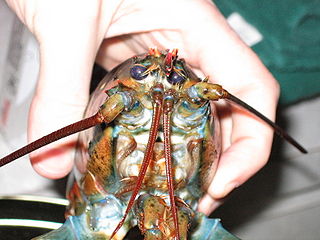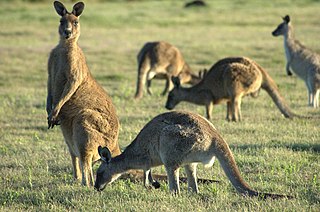The precautionary principle is a broad epistemological, philosophical and legal approach to innovations with potential for causing harm when extensive scientific knowledge on the matter is lacking. It emphasizes caution, pausing and review before leaping into new innovations that may prove disastrous. Critics argue that it is vague, self-cancelling, unscientific and an obstacle to progress.

Crabs are decapod crustaceans of the infraorder Brachyura, which typically have a very short projecting "tail" (abdomen), usually hidden entirely under the thorax. They live in all the world's oceans, in freshwater, and on land, are generally covered with a thick exoskeleton, and have a single pair of pincers on each arm. They first appeared during the Jurassic Period.

Sentience is the simplest or most primitive form of cognition, consisting of a conscious awareness of stimuli without association or interpretation. The word was first coined by philosophers in the 1630s for the concept of an ability to feel, derived from Latin sentiens (feeling), to distinguish it from the ability to think (reason).

Cephalopod intelligence is a measure of the cognitive ability of the cephalopod class of molluscs.

Fish fulfill several criteria proposed as indicating that non-human animals experience pain. These fulfilled criteria include a suitable nervous system and sensory receptors, opioid receptors and reduced responses to noxious stimuli when given analgesics and local anaesthetics, physiological changes to noxious stimuli, displaying protective motor reactions, exhibiting avoidance learning and making trade-offs between noxious stimulus avoidance and other motivational requirements.

Pain negatively affects the health and welfare of animals. "Pain" is defined by the International Association for the Study of Pain as "an unpleasant sensory and emotional experience associated with actual or potential tissue damage, or described in terms of such damage." Only the animal experiencing the pain can know the pain's quality and intensity, and the degree of suffering. It is harder, if even possible, for an observer to know whether an emotional experience has occurred, especially if the sufferer cannot communicate. Therefore, this concept is often excluded in definitions of pain in animals, such as that provided by Zimmerman: "an aversive sensory experience caused by actual or potential injury that elicits protective motor and vegetative reactions, results in learned avoidance and may modify species-specific behaviour, including social behaviour." Nonhuman animals cannot report their feelings to language-using humans in the same manner as human communication, but observation of their behaviour provides a reasonable indication as to the extent of their pain. Just as with doctors and medics who sometimes share no common language with their patients, the indicators of pain can still be understood.

There is a scientific debate which questions whether crustaceans experience pain. It is a complex mental state, with a distinct perceptual quality but also associated with suffering, which is an emotional state. Because of this complexity, the presence of pain in an animal, or another human for that matter, cannot be determined unambiguously using observational methods, but the conclusion that animals experience pain is often inferred on the basis of likely presence of phenomenal consciousness which is deduced from comparative brain physiology as well as physical and behavioural reactions.
Animal suicide is when an animal intentionally ends its own life through its actions. It implies a wide range of higher cognitive capacities that experts have been wary to ascribe to nonhuman animals such as a concept of self, death, and future intention. There is currently not enough empirical data on the subject for there to be a consensus among experts. For these reasons, the occurrence of animal suicide is controversial among academics.

Pain in invertebrates is a contentious issue. Although there are numerous definitions of pain, almost all involve two key components. First, nociception is required. This is the ability to detect noxious stimuli which evokes a reflex response that moves the entire animal, or the affected part of its body, away from the source of the stimulus. The concept of nociception does not necessarily imply any adverse, subjective feeling; it is a reflex action. The second component is the experience of "pain" itself, or suffering—i.e., the internal, emotional interpretation of the nociceptive experience. Pain is therefore a private, emotional experience. Pain cannot be directly measured in other animals, including other humans; responses to putatively painful stimuli can be measured, but not the experience itself. To address this problem when assessing the capacity of other species to experience pain, argument-by-analogy is used. This is based on the principle that if a non-human animal's responses to stimuli are similar to those of humans, it is likely to have had an analogous experience. It has been argued that if a pin is stuck in a chimpanzee's finger and they rapidly withdraw their hand, then argument-by-analogy implies that like humans, they felt pain. It has been questioned why the inference does not then follow that a cockroach experiences pain when it writhes after being stuck with a pin. This argument-by-analogy approach to the concept of pain in invertebrates has been followed by others.
Sentiocentrism, sentio-centrism, or sentientism is an ethical view that places sentient individuals at the center of moral concern. Both humans and other sentient individuals have rights and/or interests that must be considered.

Alasdair Cochrane is a British political theorist and ethicist who is currently Professor of Political Theory in the Department of Politics and International Relations at the University of Sheffield. He is known for his work on animal rights from the perspective of political theory, which is the subject of his two books: An Introduction to Animals and Political Theory and Animal Rights Without Liberation. His third book, Sentientist Politics, was published by Oxford University Press in 2018. He is a founding member of the Centre for Animals and Social Justice, a UK-based think tank focused on furthering the social and political status of nonhuman animals. He joined the Department at Sheffield in 2012, having previously been a faculty member at the Centre for the Study of Human Rights, London School of Economics. Cochrane is a Sentientist. Sentientism is a naturalistic worldview that grants moral consideration to all sentient beings.

Animal Rights Without Liberation: Applied Ethics and Human Obligations is a 2012 book by the British political theorist Alasdair Cochrane, in which it is argued that animal rights philosophy can be decoupled from animal liberation philosophy by the adoption of the interest-based rights approach. Cochrane, arguing that there is no reason that (nonhuman) animals should be excluded from justice, adopts Joseph Raz's account of interest rights and extends it to include animals. He argues that sentient animals possess a right not to be made to suffer and a right not to be killed, but not a right to freedom. The book's chapters apply Cochrane's account to a number of interactions between humans and animals; first animal experimentation, then animal agriculture, the genetic engineering of animals, the use of animals in entertainment and sport, the relationship of animals to environmental practices and the use of animals in cultural practices.

Welfare biology is a proposed cross-disciplinary field of research to study the positive and negative well-being of sentient individuals in relation to their environment. Yew-Kwang Ng first advanced the field in 1995. Since then, its establishment has been advocated for by a number of writers, including philosophers, who have argued for the importance of creating the research field, particularly in relation to wild animal suffering. Some researchers have put forward examples of existing research that welfare biology could draw upon and suggested specific applications for the research's findings.

Pain in cephalopods is a contentious issue. Pain is a complex mental state, with a distinct perceptual quality but also associated with suffering, which is an emotional state. Because of this complexity, the presence of pain in non-human animals, or another human for that matter, cannot be determined unambiguously using observational methods, but the conclusion that animals experience pain is often inferred on the basis of likely presence of phenomenal consciousness which is deduced from comparative brain physiology as well as physical and behavioural reactions.

Gary Edward Varner was an American philosopher specializing in environmental ethics, philosophical questions related to animal rights and animal welfare, and R. M. Hare's two-level utilitarianism. At the time of his death, he was an emeritus professor in the department of philosophy at Texas A&M University; he had been based at the university since 1990. He was educated at Arizona State University, the University of Georgia, and the University of Wisconsin–Madison; at Madison, where he was supervised by Jon Morline, he wrote one of the first doctoral theses on environmental ethics. Varner's first monograph was In Nature's Interests?, which was published by Oxford University Press in 1998. In the book, Varner defended a form of biocentric individualism, according to which all living entities have morally considerable interests.

The ethics of uncertain sentience refers to questions surrounding the treatment of and moral obligations towards individuals whose sentience—the capacity to subjectively sense and feel—and resulting ability to experience pain is uncertain; the topic has been particularly discussed within the field of animal ethics, with the precautionary principle frequently invoked in response.
Liam Kofi Bright is a British philosopher of science and assistant professor at the Department of Philosophy, Logic, and Scientific Methods at the London School of Economics. He works primarily on science and truth, as well as formal social epistemology. Some of his other work has been on Africana philosophy and formal modelling of social phenomena like intersectionality. Bright won the Philip Leverhulme Prize in the category of philosophy and theology in 2020.
Catia Faria is a Portuguese moral philosopher and activist for animal rights and feminism. She is assistant professor in Applied Ethics at the Complutense University of Madrid, and is a board member of the UPF-Centre for Animal Ethics. Faria specialises in normative and applied ethics, especially focusing on how they apply to the moral consideration of non-human animals. In 2022, she published her first book, Animal Ethics in the Wild: Wild Animal Suffering and Intervention in Nature.

The Animal Welfare (Sentience) Act 2022 is an act of the Parliament of the United Kingdom. It was introduced to Parliament by the Government of the United Kingdom at the 2021 State Opening of Parliament. The act recognises animal sentience in law for the first time. The scope of the legislation includes all vertebrates and some invertebrates such as octopuses and lobsters.
Octopus bocki is a species of octopus, which has been located near south Pacific islands such as Fiji, the Philippines, and Moorea and can be found hiding in coral rubble. They can also be referred to as the Bock's pygmy octopus. They are nocturnal and use camouflage as their primary defense against predators as well as to ambush their prey. Their typical prey are crustaceans, crabs, shrimp, and small fish and they can grow to be up to 10cm in size.














